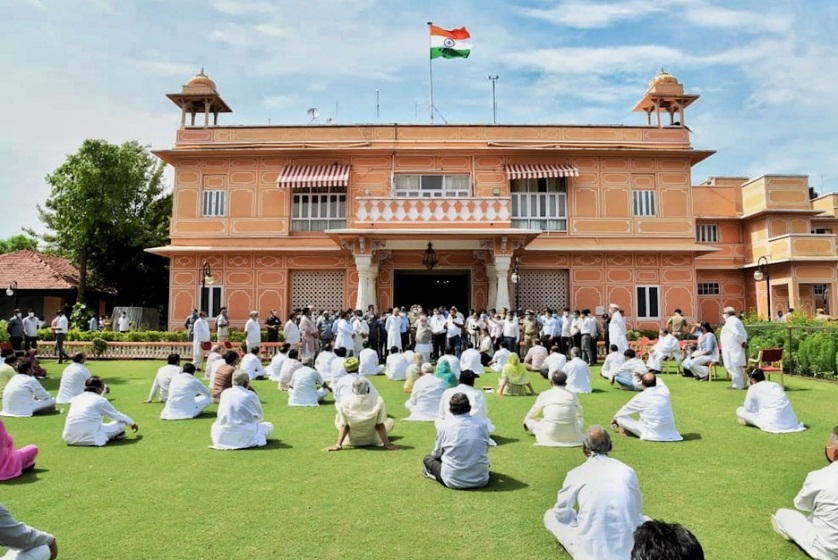S Saraswathi
Raj Bhavans became the venues for protests by members of the Congress party in many states on 27 July “to highlight the gravity of the issue and draw people’s attention to violations of the Constitution” in Rajasthan. The question of determining defection from political parties and the various possibilities of using the law by diverse players is a complicated matter.
This case started in the High Court of Rajasthan when the former Deputy Chief Minister Sachin pilot complained against disqualification notices issued by the Speaker to 19 rebel Congress MLAs. The Speaker approached the Supreme Court with a special leave petition, saying that a court cannot bar a Speaker from acting on disqualification notice even before a decision is taken. The Speaker later withdrew his petition.
The fault of the rebel members that earned them the disqualification notices from the Speaker was defiance of the whip issued by the Congress and failure to attend Congress Legislative Party meetings on two days. This team of Sachin Pilot challenges the notices and maintains that it is only seeking leadership change in the “most democratic manner.”
Chief Minister Ashok Gehlot along with 100 legislators had reason to stage a dharna on the lawns of Raj Bhavan, demanding convening of the Assembly session, primarily to prove his majority. He did not succeed and ended the dharna after about five hours. A list of MLAs numbering 102 was submitted to the Governor, as his supporters.
The CM met the Governor the next day and insisted on convening the assembly session. Deciding on dates for the Assembly session, fixing the procedures, and setting the agenda are in the domain of the cabinet. The Governor initially questioned the necessity for a floor test when the government was claiming the support of a majority. The revised note of the CM to the Governor mentioned only the need for a special session to discuss the situation on Covid-19 and to introduce six bills.
On 27 July, the Governor agreed to convene the assembly on the condition that 21 days’ notice should be given to the members as per rules and social distancing norms must be followed. As floor test was not included in the agenda, a short notice was not enough.
The legal course, neither in the state nor at the Centre, was so far favourable to the Congress. The alternative, in keeping with the current trend in Indian party politics, is to take the fight outside the courts and on the roads.
The CM’s posture was the immediate response to the Rajasthan High Court direction to the Speaker on maintaining the status quo on the disqualification notices he had issued to 18 rebel Congress MLAs and Sachin Pilot, under clause 2(1) (a) of the Constitution’s Tenth Schedule. The order itself had come after the Supreme Court refused to restrain the High Court from ruling on the matter on the plea of the Speaker.
The Tenth Schedule including para 2(1)(a) on freedom of speech, vote or conscience of elected members, which was validated by the Supreme Court in 1992, mentions two grounds for disqualification of a member – one, when he voluntarily gives up membership of the party; and the other, if he votes or abstains from voting contrary to any direction issued by his party, meaning if he violates whip. Pilot asks for deletion of this provision.
A judgement of the Supreme Court in 1994 has clarified that voluntarily giving up membership does not require a formal resignation from the party, but may be inferred from certain actions. It paved way for party action against members for having and/or expressing views different from that of the party or party leaders while remaining within the party. Party discipline overtook inner party democracy.
This judicial interpretation was followed in UP in 2003 when 13 MLAs of the BSP were disqualified for supporting the SP chief to form the government as against their leader’s advice to dissolve the assembly. It was an inference by the court that the action of those MLAs was a proof that they had voluntarily given up their membership of the BSP. This provision has remained a contentious issue ever since it was written. Even courts have taken varied stand on what constitutes defection.
–INFA. The writer is former Director, ICSSR, New Delhi.
